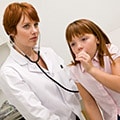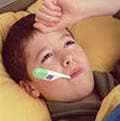


1. Use U.S. Coast Guard-approved life jackets on the water.
2. Put on sunscreen and a wide-brimmed hat to protect your skin from the sun.
3. Drink plenty of water even if you don’t feel thirsty.
4. Put on insect repellent.
5. Wash your hands often.
- - - - - - - - - - - -
 It's also important to visit your local county health department to make sure you are keeping up with all the immunizations, health screenings and testing that are essential for your health and the health of the ones you love. The public health departments within the North Georgia Health District are located in Cherokee, Fannin, Gilmer, Murray, Pickens and Whitfield Counties. Just click on the name of your county for access to health department information, including all available public health services and the health department's address and phone number.
It's also important to visit your local county health department to make sure you are keeping up with all the immunizations, health screenings and testing that are essential for your health and the health of the ones you love. The public health departments within the North Georgia Health District are located in Cherokee, Fannin, Gilmer, Murray, Pickens and Whitfield Counties. Just click on the name of your county for access to health department information, including all available public health services and the health department's address and phone number.
YOU could be HIV positive. Get FREE Testing!
 North GA - Why should you get an HIV test?
North GA - Why should you get an HIV test?
Because, according to Centers for Disease Control and Prevention (CDC) officials, about one in seven people in the United States is HIV positive and they don’t know it. If you are age 13 to 64, you should get tested for HIV at least once. *People at higher risk should get tested more often.
National HIV Testing Day on Wednesday, June 27th is your opportunity in North Georgia to get HIV tested for FREE at your local public health department in Cherokee, Fannin, Gilmer, Murray, Pickens and Whitfield Counties or at The Living Bridge Center in Dalton. Just click on the above LOCATIONS tab to find your health department or The Living Bridge Center hours of operation, phone number and location, or call the North Georgia Health District at (706) 529-5757.
Our HIV testing is fast, safe and confidential.
National HIV Testing Day is an annual occasion to encourage people to get an HIV test. CDC recommends that everyone between the ages of 13 and 64 get tested for HIV at least once as part of routine health care. *People with certain risk factors should get tested more often. People who test HIV positive can take medicines to stay healthy and greatly reduce their chance of transmitting the virus. People who test negative can continue to take steps to prevent HIV infection, such as always using a condom during sex.
 this Summer in North Georgia!
this Summer in North Georgia!

Come get your delicious fresh fruits and vegetables this summer at several Farmers Markets presented by North Georgia's Women, Infants and Children (WIC) services.
Affordably priced and locally grown, these fresh fruits and vegetables come with free recipes for preparing healthy, nutritious and scrumptious meals!
Families on the WIC program who attend will be provided $30 worth of produce one time this year.
Participating farmers are from Brown’s Produce of Tunnel Hill and R & A Orchards of Ellijay.
 The Farmers Markets will be held this summer on these dates at these locations:
The Farmers Markets will be held this summer on these dates at these locations:
For more information, call (706) 370-4700.



All the latest guidance and recommendations from the Georgia Department of Public Health and the CDC can be found on the North Georgia Health District website at http://bit.ly/COVID19-Updates-NorthGA.
See these WIC APPROVED FOOD CHANGES due to COVID-19 until September 30, 2020
The Women, Infants, and Children (WIC) Supplemental Nutrition Program is a federally-funded health and nutrition program© for:
Generally, WIC is available to:
You can take the WIC Eligibility Assessment to see if you qualify* or contact your local WIC office to make an appointment and find out which documents you will need to bring with you. (To find your local WIC agency use the clinic listing) At your appointment, WIC staff will check to see if you and your family qualify).
*This online tool is only a preliminary assessment – only Local WIC Agency staff can determine if you qualify for WIC services.
WIC has offices in all our North Georgia public health departments in Cherokee, Fannin, Gilmer, Murray, Pickens and Whitfield Counties - click on the name of the county nearest you for your North Georgia WIC contact information or dial 1-866-942-9675.
Women, Infants, and Children (WIC)
2 Peachtree Street, NW
10th Floor
Atlanta, GA 30303
Participants should call: 1-800-228-9173
Vendors should call: 1-866-814-5468
Office of the Inspector General
Email Reports of Fraud, Waste & Abuse
/sites/dph.georgia.gov/files/DistrictMap.pdf
This institution is an equal opportunity provider.
For CDC WIC Info visit the CDC page.
From the Centers for Disease Control and Prevention (CDC)
Time to take steps to be healthier, but you're NOT alone!
 National Men’s Health Week is observed each year leading up to Father’s Day. This week is a reminder for men to take steps to be healthier, but they don’t have to do it alone! Whether it’s your husband, partner, dad, brother, son, or friend you can help support the health and safety of the men in your life.
National Men’s Health Week is observed each year leading up to Father’s Day. This week is a reminder for men to take steps to be healthier, but they don’t have to do it alone! Whether it’s your husband, partner, dad, brother, son, or friend you can help support the health and safety of the men in your life.
For more information, contact your local North Georgia public health department in Cherokee, Fannin, Gilmer, Murray, Pickens or Whitfield County (click on county name to link to health department page and contact information).
You can support the men in your life by having healthy habits yourself and by making healthy choices.
Although Zika is primarily spread through mosquitoes, it can also be spread through sex by a person with Zika to his or her sex partner(s). If you’ve traveled to an area with Zika, use a condom to protect against infection every time you have sex (vaginal, anal, and oral sex). This is especially important if your partner is pregnant because Zika can cause serious birth defects. Learn more about Zika and Sex, including how to use a condom and how long you should use condoms after travel. Condoms can also protect against HIV and other STDs.
Encourage men to see a doctor or health professional for regular checkups and to learn about their family health history.
Every 43 seconds someone in the U.S. has a heart attack. Know the signs of a heart attack and if you think you or someone you know is having a heart attack call 911 immediately. Major signs of a heart attack include:
Depression is one of the leading causes of disease or injury worldwide for both men and women. Learn to recognize the signs and how to help the men in your life.

 We are joining organizations across the country to team up for Men’s Health!
We are joining organizations across the country to team up for Men’s Health!
To celebrate Men’s Health Month, North Georgia Health District joins Men’s Health Network, the Congressional Men’s Health Caucus, and hundreds of other local and national organizations to educate the public about the many preventable health problems that affect men and boys, and empower them and their loved ones to move towards a healthier, happier life.
Men die five years younger than women, on average, and die at higher rates for nine of the Top Ten causes of death. Men are the majority of workplace injuries, less likely to be insured, and far less likely to see a doctor for preventive care. All of this impacts their ability to be an involved father, supportive husband, and engaged member of their community.
“This year continues to be a pivotal one for men’s health—new guidance on prostate cancer screenings and the declining mortality rates for large groups of men means awareness and education is paramount,” says Ana Fadich, Vice President at Men’s Health Network.
More information is at our health departments in Cherokee, Fannin, Gilmer, Murray, Pickens and Whitfield Counties. Click on the above LOCATIONS tab to find the one nearest you.
June is also National Men’s Health Week (NMHW), passed by Congress and signed into law by President Clinton in 1994. It starts Monday, June 11, and ends on Father’s Day, June 17, 2018. Additional support comes from governors and mayors who issue proclamations for Men’s Health Week in their jurisdictions. You can find the proclamations here: http://www.menshealthmonth.org/week/proclamation.html You can also find more information on a variety of health issues at the Men’s Health Resource Center: www.MensHealthResourceCenter.com and health profiles of men and boys in each state can be found at www.stateofmenshealth.com

-Story by Raymond King, Director of Environmental Health, North Georgia Health District 1-2
Once flood waters in an area have receded and the most immediate safety hazards have passed, it's time to address the secondary health issues that can develop as a result of floodwater pollutants.
Be sure to protect your home, family and business by following these environmental health guidelines.
Keep Away from Flood Waters
Avoid any contact with flood waters, such as swimming, after a flood. Flood waters can contain large amounts of contaminants of all kinds, which can be hazardous. Fishing and other non-contact activities would not be affected.
Sanitize Flooded Areas
Floors, walls, equipment and furniture that have been covered with flood waters should be cleaned and sanitized to kill any bacteria or viruses. Wear gloves, eye protection and boots when working with contaminated areas and items. Items should be cleaned with soap and water, rinsed and then sanitized with a solution of a quarter cup of household bleach and one gallon of water. Do not mix bleach with any ammonia product and work in well-ventilated areas.
Mold
Mold is the most long-lasting effect of flooding. Unless a home's structural materials are completely dried, mold will grow behind the walls and under the floors. Do not replace sheet rock and other materials until the wood is dry, or mold will grow. If mold is already growing, spray the area with a household bleach solution. Keep the area vented and wear eye protection, gloves and boots. Contact your local county environmental health staff for more information about mold.
Well and Spring Contamination
If a well or spring was covered with flood waters, it must be considered contaminated. Do not drink or prepare foods with water from a well until it is disinfected and tested. Buy bottled water to drink and use for cooking.
The first recovery step is to pump out the well thoroughly, letting it run for at least 24 hours or until the water has no obvious color or smell. An outside faucet may be left on to run slowly for long periods of time so no damage will occur to the well pump.
Disinfect well water systems with two gallons of plain household bleach. Remember to not drink, bathe or cook with the water while bleach is in the system. Pour the bleach into the well or spring. Run all faucets until the bleach smell comes through in the water, then shut them off. Let the bleach stay in the water system for at least eight hours. To rid the system of bleach, turn on an outside faucet and let it run until all the bleach is gone, which may take 24 hours or longer. Only use an outside faucet to discharge the bleach water. Once the bleach is gone, make sure that the well or springhouse is sealed.
It may take two or more bleach disinfection procedures to rid the well or spring of contamination. For more information, contact the University of Georgia Cooperative Extension office in your county.
Septic System Failures
In most cases of septic system failure, the only thing that can be done is to wait for the water levels in the soil to fall. If sewage comes to the top of the ground, the tank could be pumped for temporary relief. Usually, it does not take long for the system to function properly again. If flooding washed away the soil around the system, the system may need to be repaired or replaced. Call the local environmental health office with questions about a septic system.
Spoiled Food and Food Poisoning
If any flood waters have touched foods, throw them out. If the temperature in a refrigerator was at 60 degrees or higher for more than two hours, do not eat the food inside. There's no reliable way to tell if food will make you sick by looking at it or smelling it. When in doubt, throw it out.
Mosquitoes
Flooding leaves pools of water that are ideal for breeding mosquitoes, which can carry diseases like West Nile virus. Dump any water-filled containers around your home to discourage mosquitoes. Water that cannot be drained can be treated with certain insecticides and biological control agents. Always follow the label instructions for pesticides.
For more information about preventing health hazards after a flood, please call your local environmental health office (see contact info by clicking on above LOCATIONS tab) or visit the U.S. Centers for Disease Control and Prevention (CDC) website.

Activities Planned for People of ALL Ages!
Canton (GA) – Prepare to let your inner super hero shine at the Express Your SuperPower 5K/10K. The date is Saturday, September 22, 2018, but now is the time to register for this fun, family event held annually at the Etowah River Park on Brown Industrial Parkway in Canton. Log onto www.expressyoursuperpower5k.com.
Activities are planned for people of all ages as we raise awareness of breastfeeding and the health of babies and children.
Both a walking and running event, the Express Your SuperPower 5K/10K begins at 8 a.m. See the following Express Your SuperPower 5K/10K Activities and Details at a Glance guide.
 Come dressed as your favorite super power hero for a chance to win a prize for your costume!
Come dressed as your favorite super power hero for a chance to win a prize for your costume!
Carol Hendrix, Women, Infants and Children (WIC) Breastfeeding Coordinator for the North Georgia Health District, said, “We join each year with our breastfeeding coalition at the local and state levels to present the Express Your SuperPower 5K/10K as an extension of our celebration of World Breastfeeding Week, observed annually August 1 – 7. Proceeds go to the Northwest Georgia Breastfeeding Coalition and the Georgia Breastfeeding Coalition.”
Breastfeeding is a vitally important public health issue that affects all Georgians.
According to the Centers for Disease Control and Prevention (CDC), breastfeeding is the best method for early infant feeding and the healthiest option for most mothers and babies. Mothers and their children show short-term and long-term health benefits from breastfeeding. Although 80% of mothers start out breastfeeding, more than 50% stop before they intended. Only about 22% of infants are being exclusively breastfed as recommended by the time they are 6 months old. These low rates of breastfeeding add more than $2 billion a year to direct medical costs in the United States.1
The CDC also emphasizes the necessity of physical activity for everyone.
The CDC states that physical activity offers many benefits for the health of individuals and communities. Getting enough physical activity can prevent 1 in 8 cases of breast cancer, 1 in 8 cases of colorectal cancer, 1 in 8 cases of type 2 diabetes and 1 in 12 cases of heart disease.2
The Express Your SuperPower 5K/10K is not only a terrific opportunity for you and your family to engage in physical activity but to also support breastfeeding awareness.
Register today for the Express Your SuperPower 5K/10K at www.expressyoursuperpower5k.com
_______________________________________________________________
Express Your SuperPower 5K/10K Activities and Details at a Glance:
Saturday, September 22, 2018
Etowah River Park, Brown Industrial Parkway, Canton, GA
5K, 10K, 1m, Fun Run - $25 Entry Fee
Tot Trot - $10 Entry fee
Race Day Schedule
7:00 am - Race Day Check in Starts
8:00 am - 5K & 10K start
Course
The 5K course starts and finishes in Etowah River Park and is FLAT except for the bridge over the river. The 10K course is a double loop, and should provide a perfect opportunity if you're wanting to do your 1st 10K. If you're a seasoned 10K vet, this should provide you with an opportunity to get a PR.
Timing & Awards
The event will be chip timed and we'll have awards for the Overall M/F, Overall Master's M/F, as well as top finishers in all the normal 5yr age groups starting at 10 & under through 75+.
Finish Line & Post Race Refreshments
Super Heroes, music and a ton of fun stuff await you at the end of your run.
Five Star Turkey Trot & Five Star Championships
All participants will be eligible for free entry into the Five Star Turkey Trot on Thanksgiving Day. Top finishers will earn a spot in the Five Star 5K championships.
_______________________________________________________________
1, 2 https://www.cdc.gov/chronicdisease/resources/publications/aag/dnpao.htm
From the Centers for Disease Control and PreventionSkin Cancer Prevention


From the Centers for Disease Control and Prevention (CDC)
Meningitis
 Meningitis is an inflammation (swelling) of the protective membranes covering the brain and spinal cord. A bacterial or viral infection of the fluid surrounding the brain and spinal cord usually causes the swelling. However, injuries, cancer, certain drugs, and other types of infections also can cause meningitis. It is important to know the specific cause of meningitis because the treatment differs depending on the cause.
Meningitis is an inflammation (swelling) of the protective membranes covering the brain and spinal cord. A bacterial or viral infection of the fluid surrounding the brain and spinal cord usually causes the swelling. However, injuries, cancer, certain drugs, and other types of infections also can cause meningitis. It is important to know the specific cause of meningitis because the treatment differs depending on the cause.
Meningitis caused by bacteria can be deadly and requires immediate medical attention. Vaccines are available to help protect against some kinds of bacterial meningitis.
Meningitis caused by viruses is serious but often is less severe than bacterial meningitis. People with normal immune systems who get viral meningitis usually get better on their own. There are vaccines to prevent some kinds of viral meningitis.
Meningitis caused by fungi is rare, but people can get it by inhaling fungal spores from the environment. People with certain medical conditions, like diabetes, cancer, or HIV, are at higher risk of fungal meningitis.
Various parasites can cause meningitis or can affect the brain or nervous system in other ways. Overall, parasitic meningitis is much less common than viral and bacterial meningitis. (https://www.cdc.gov/meningitis/parasitic.html)
Primary amebic meningoencephalitis (PAM) is a rare and devastating infection of the brain caused by Naegleria fowleri. Naegleria fowleri is a free-living microscopic ameba that lives in warm water and soil. (https://www.cdc.gov/meningitis/amebic.html)
Sometimes cancers, systemic lupus erythematosus (lupus), certain drugs, head injury, and brain surgery can cause meningitis.
How it Spreads
 Bacterial Meningitis
Bacterial MeningitisGenerally, the germs that cause bacterial meningitis spread from one person to another. Certain germs can spread through food. How people spread the germs often depends on the type of bacteria. Read about common examples of how people spread the different types of bacteria to each other.
People can spread the viruses that cause viral meningitis to other people. If you have close contact with someone who has viral meningitis, they may spread the virus to you. However, you are not likely to develop meningitis. That’s because most people infected with these viruses will not develop meningitis.
Meningitis Versus Meningococcal Disease:
There IS a Difference
Having meningitis doesn’t always mean you have meningococcal disease. And having meningococcal disease doesn’t necessarily mean you have meningitis. Meningococcal disease is any illness caused by a type of bacteria called Neisseria meningitidis. These illnesses are serious and include meningitis and bloodstream infections (septicemia). More about meningococcal disease…(https://www.cdc.gov/meningococcal/index.html)
Resources for Healthcare Professionals
Get clinical disease information, as well as vaccine recommendations and vaccination resources, for common causes of meningitis. More >
.
Five College Consortium
The Five College consortium in Massachusetts (MA) is experiencing an outbreak of serogroup B meningococcal disease. The MA Department of Public health recommends vaccination to students at all five schools.
Oregon State University
Oregon State University (OSU) has an ongoing outbreak of serogroup B meningococcal disease. Students should check with OSU about requirements to get vaccinated with a serogroup B meningococcal vaccine. Learn more from OSU.
Ver opción en Español en la parte superior de esta página
The North Georgia Health District is part of the Georgia Department of Public Health. This District is comprised of six counties including Cherokee, Fannin, Gilmer, Murray, Pickens, and Whitfield. Many programs and services exist throughout the district, all of which are designed to meet the needs of the people of North Georgia.
Our vision for the North Georgia Health District is healthy people, families and communities.
Our mission is to promote and protect the health of the people in the North Georgia Health District wherever they live, work and play, through population-based preventive programs including: